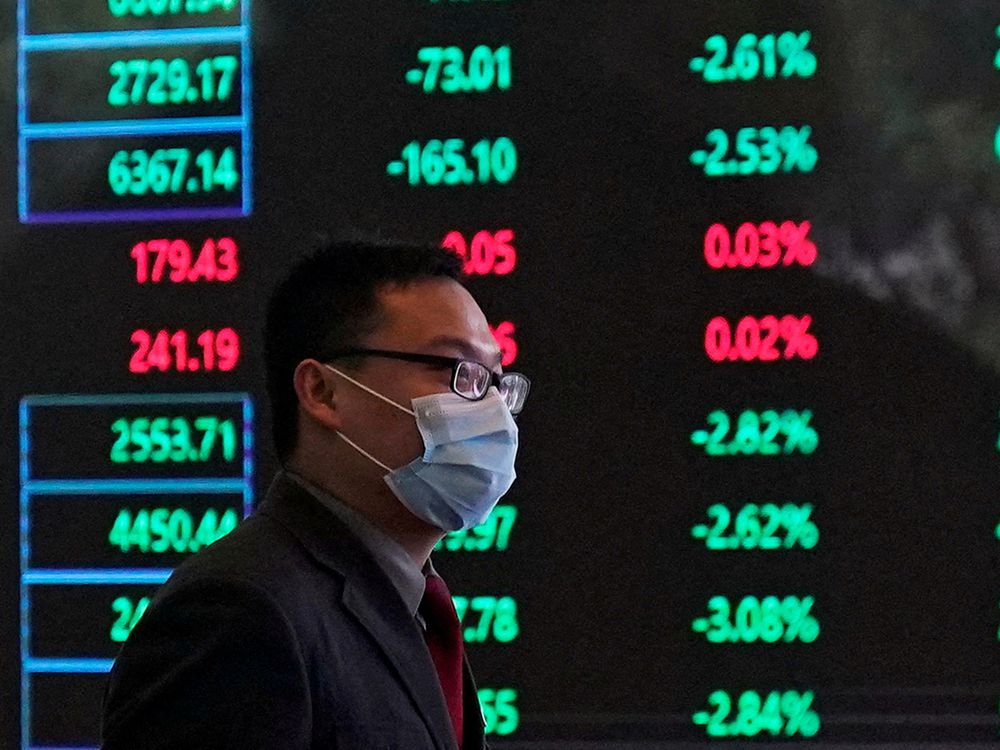‘China has more contagion effect than Russia’
Author of the article:
Bloomberg News
Srinivasan Sivabalan and Carolina Wilson
A man inside the Shanghai Stock Exchange building at the Pudong financial district in Shanghai, China. Photo by REUTERS/Aly Song//File Photo As traders grapple with the breakout of war in Europe, the prospect of a new regulatory crackdown in China is getting lost in the headlines, but potentially poses a larger risk to emerging-market assets.
Advertisement 2 This advertisement has not loaded yet, but your article continues below.
A meltdown in Chinese technology shares after authorities told food-delivery platforms to cut their fees last month has fuelled bigger losses for MSCI Inc.’s Emerging Markets Index than even Russia’s invasion of Ukraine. That’s because China accounts for about 30 per cent of the gauge, while Russia is just over 1.5 per cent.
Traders are now concerned that this week’s meeting of the National People’s Congress could precede a renewed crackdown, even as opening remarks from Premier Li Keqiang emphasized that venture capital still has a role to play.
“China has more contagion effect than Russia,” said Brendan Mckenna, a strategist at Wells Fargo Securities LLC in New York. “When a shock occurs in China, just about all of EM reacts. A shock in Russia usually just spills over to regional Eastern Europe.”
Advertisement 3 This advertisement has not loaded yet, but your article continues below.
The impact of Chinese stock losses on the broader emerging-market gauge may get even more pronounced. MSCI is among the benchmark providers kicking “uninvestable” Russian equities out as Moscow’s stock exchange remains shuttered, sanctions escalate and liquidity dries up. As of March 9, the country’s assets will be removed from the gauge entirely.
That leaves stock traders to focus on how President Xi Jinping’s government is working to rein in the country’s most powerful corporations. In just the past two weeks, China has told banks to report their financial exposure to Ant Group Co. and set out demands to cap fees by ride-hailing and food-delivery platforms.
While emerging-market stocks get savaged by the war in Ukraine, tech shares affected by China’s clampdowns are hurting even more.
Advertisement 4 This advertisement has not loaded yet, but your article continues below.
The Hang Seng Tech Index has plunged 20 per cent in dollar terms since the advent of new regulation in mid-February, double the losses witnessed in the broader developing-nation benchmark. That’s sent the tech gauge’s ratio relative to emerging markets to the lowest level since 2019.
A group of consumer stocks including Alibaba Group Holding Ltd. and Meituan is one of the worst drags on the index, data compiled by Bloomberg show.
“The environment is still uncertain in terms of regulatory framework and we would need more clarity to assess the impact on equities,” said Leonardo Pellendini, a strategist at Bank Julius Baer.
Traders are bracing for further takeaways from the National People’s Congress, China’s biggest political event before a twice-a-decade party leadership reshuffle slated for later this year.
Advertisement 5 This advertisement has not loaded yet, but your article continues below.
More On This Topic Bill Ackman’s Pershing Square takes new stake in CP Rail worth $280 million Saudi prince’s US$500 billion ‘Neom’ megaproject woos Wall Street Four ways Canadians can protect themselves from a worsening market situation So far, policy-makers have set an aggressive economic growth target of about 5.5 per cent, adopted measures to keep housing prices stable and vowed to address social issues such as human trafficking. Premier Li also described the prevention of “unregulated expansion of capital” as one of last year’s achievements.
The reemergence of regulatory risk in China is a headache for money managers including JPMorgan Chase & Co. and Mobius Capital Partners LLP, which had expected the threat to cool in 2022. They anticipated Chinese equities would rally on the country’s easy monetary policy and economic revival.
This advertisement has not loaded yet, but your article continues below.
Article content But some investors are still buying discounted shares with a focus on longer-term growth potential.
“Any selling at this point isn’t really a rational move due to any worsening expectations on the regulatory environment. Those trading on that may have acted long ago,” said Cai Dian, a fund manager at Beijing Eastern Smart Rock Asset Management Co.
That said, “the shares are still ultra sensitive and tend to overreact to negatives, such as the delivery fee reduction news. That kind of short-term trading is amplifying volatility.”
Bloomberg.com
_____________________________________________________________
For more stories like this one, sign up for the FP Investor newsletter.
______________________________________________________________
Financial Post Top Stories Sign up to receive the daily top stories from the Financial Post, a division of Postmedia Network Inc.
By clicking on the sign up button you consent to receive the above newsletter from Postmedia Network Inc. You may unsubscribe any time by clicking on the unsubscribe link at the bottom of our emails. Postmedia Network Inc. | 365 Bloor Street East, Toronto, Ontario, M4W 3L4 | 416-383-2300
